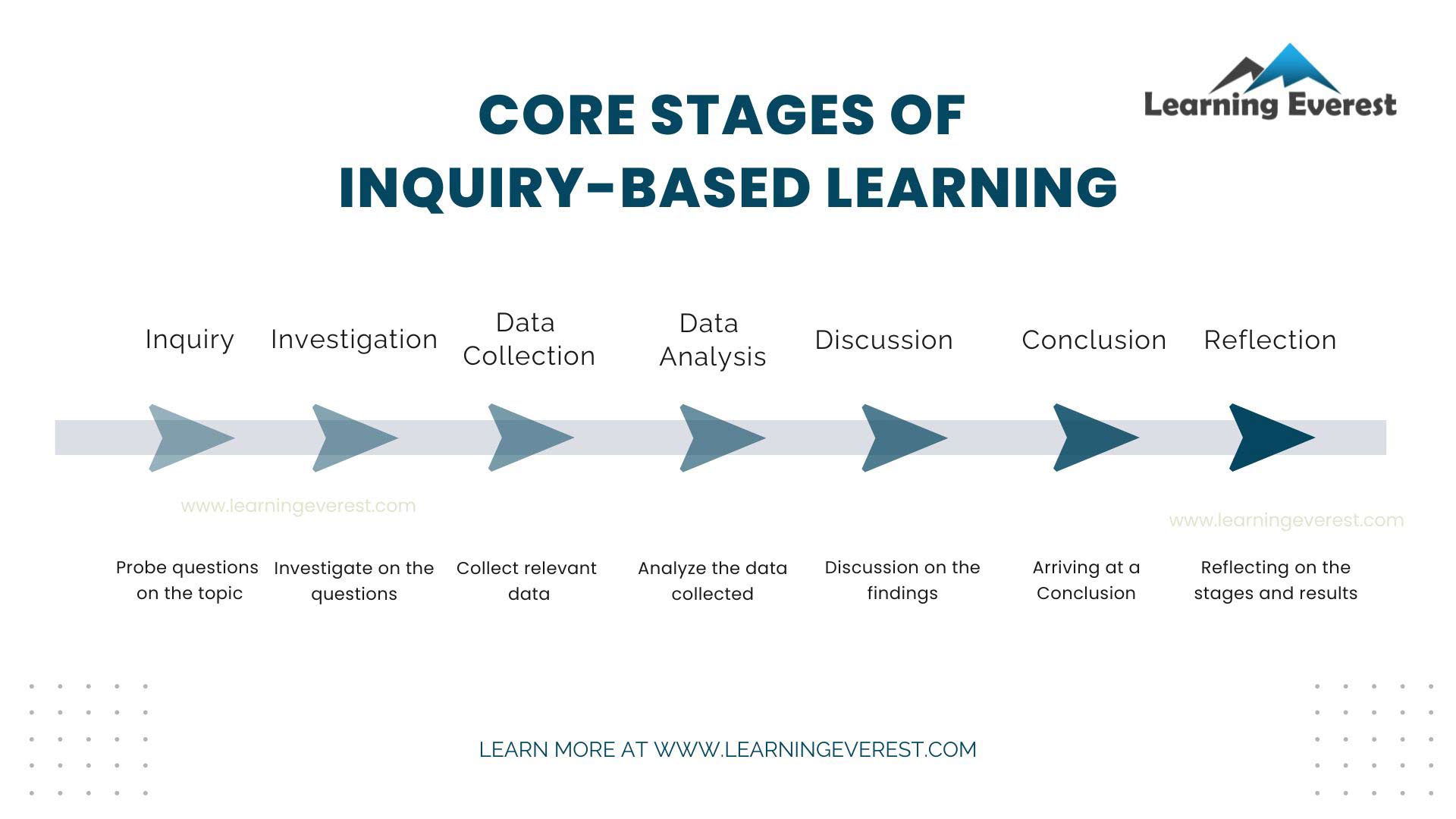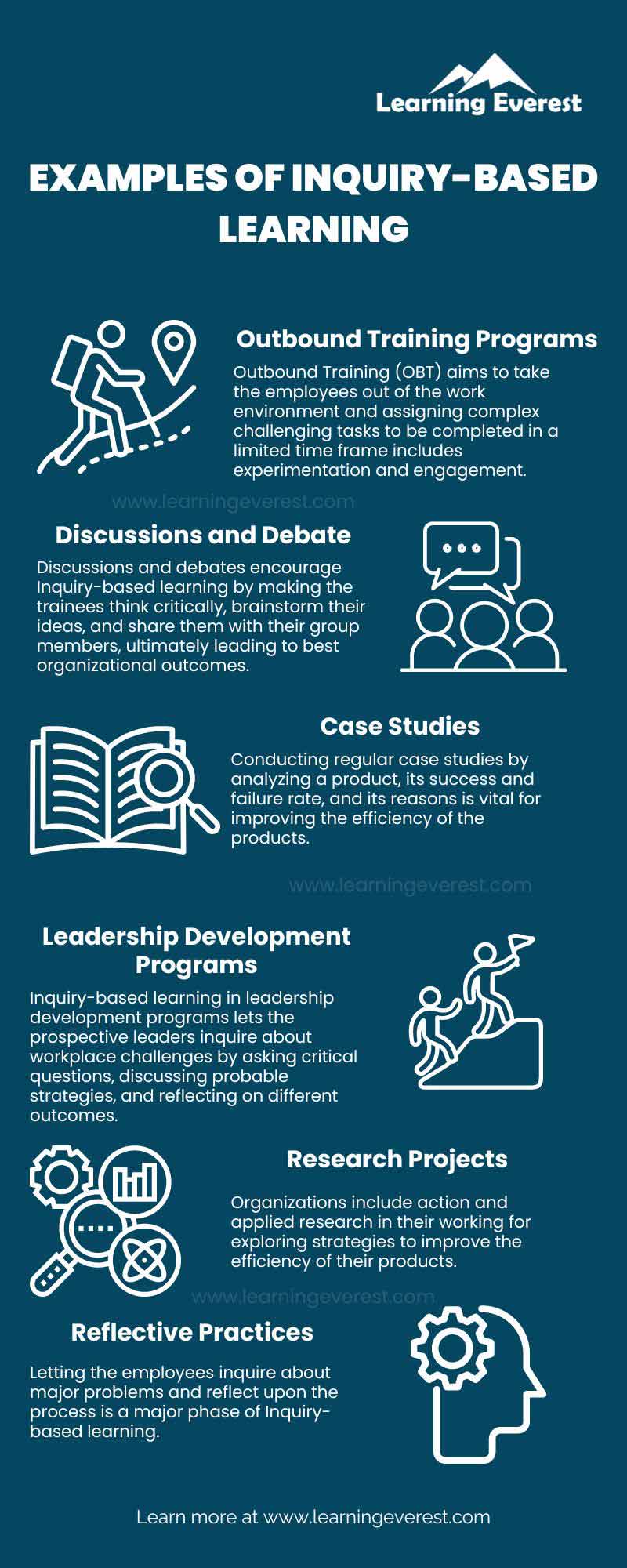Inquiry-based learning examples can be found across all facets of professional endeavors. With its active investigation, analysis, critical thinking, and problem-solving skills, this approach is used in diverse fields for training purposes.
Table of Contents
- Core stages in all Inquiry-based learning examples
- Inquiry-based learning examples in development and training programs
- Inquiry-based learning examples in the field of technology
- Conclusion
- Infographic
- Knowledge Check!
- Frequently Asked Questions (FAQs)
- What are the stages of Inquiry-based learning?
- What are the popular Inquiry-based learning examples?
Organizations adopt Inquiry-based learning examples to enhance employee capabilities and effectiveness. What awaits you in the following paragraphs is the real-world scenarios where you can witness Inquiry-based learning examples.
Core stages in all Inquiry-based learning examples

Core stages of Inquiry-based learning
Every Inquiry-based learning example involves the seven core stages of the approach. These stages help the learners to structure the learning experience and promote deeper engagement and productivity. The different stages are:
- Inquiry or posing a question
- Investigation of the topic
- Collection of data
- Data Analysis
- Discussion of the results
- Conclusion
- Reflection
Organizations adopt these stages of Inquiry-based learning in diverse arenas of the work to improve their performance.
Inquiry-based learning examples in development and training programs
Outbound Training Programs
Outbound Training (OBT) is a technique used to enhance the efficiency of employees by taking them out of the work environment and assigning complex challenging tasks to be completed in a limited time frame. OBT works on the principles of Inquiry-based learning as the employees involve themselves in experimentation and provide hands-on experience. It also promotes teamwork, collaboration, and reflection on the task assigned resulting in long-lasting learning.
Discussion and Debate
Group discussions and debates form a major part of the corporate training programs. Both discussions and debates encourage Inquiry-based learning by making the trainees think critically, brainstorm their ideas, and share them with their group members. This fosters the innovation of the individuals and motivates them to raise creative ideas for the betterment and for attaining organizational outcomes.
Case studies
Conducting regular case studies by analyzing a product, its success and failure rate, and its reasons is vital for improving the efficiency of the product. Such Inquiry-based learning can be applied at all levels with employees inquiring about the case, identifying the main problems, analyzing every aspect of the case, group discussions, developing and evaluating solutions, and finally making recommendations for action. In addition, case studies can provide organizational success by letting employers examine the strategies that provided the best and weak results and making necessary changes in the next phase.
Leadership Development Programs
Inquiry-based learning examples can be best applied in the field of leadership development in an organization. The companies must conduct such programs to identify the leaders who can best contribute to their growth. A structured or guided approach can contribute to giving the best results in this scenario by letting the prospective leaders inquire about workplace challenges by asking critical questions, discussing probable strategies, and reflecting on different outcomes.
Research Projects
Inquiry and Research are two convergent terms and concepts with identical approaches. Research projects in an organization may be regarded as an Inquiry-based learning example as the companies involve themselves in applied or action research. In the case of applied research, looking for strategies to improve the efficiency of products can employ this learning approach. Action research centering around four basic stages of planning, acting, observing, and reflecting is a problem-solving method that can adopt Inquiry-based learning in all its stages.
Reflective Practice
Reflection is a major phase of Inquiry-based learning. Studies conducted by BetterUp coaching platform suggest that reflective practices in an organization can increase performance by 23 percent. Inquiry-based learning can be adopted in training and development programs of companies by letting the employees inquire about major problems and reflect upon the process.
Let’s go ahead and discuss the use case of Inquiry-based learning examples in Information Technology sector.
Inquiry-based learning examples in the field of technology
The field of Information Technology is expanding so rapidly that imagining life without technology is now inconceivable. A report published by Statista Research Department suggests that small companies spent roughly 59 hours on training per employee in 2023. Inquiry-based Learning can therefore serve as a substitute for traditional training, allowing the organization to allocate that time for other productive activities. Inquiry-based learning examples find a prominent role in the IT sector for the employees to learn, unlearn, and relearn at their respective companies while developing their products, consulting other clients, and offering services.
Product development and enhancement
The employees and the trainees can use Inquiry-based learning while developing their products. The phases of Inquiry-based learning can be effectively applied by asking questions on what type of product needs to be developed, planning on the different stages, and creating innovative solutions using programming languages or other software. Furthermore, this calls for longer retention of the trainee resulting in better performance when enhancing existing products.
Project-based learning
Project-based learning is an example of Inquiry-based learning in the corporate sector. This learning encourages new joiners and existing employees to conceptualize the project themselves, experiment through coding and decoding, and finally present the output. This improves the technical proficiency of the individuals, thereby leading to a higher success rate for the organization.
Hackathons
A hackathon or a codefest is considered an event where developers, designers, and engineers collaborate on developing new software in a shorter period. Adopting Inquiry-based learning in such scenarios where the beginners can work with the more experienced ones through investigation, planning, hands-on experimentation, and discussion. Apart from achieving knowledge of the process, this encourages critical thinking and collaborative problem-solving in the learners.
Workshops
Organizations conduct regular workshops for their employees to perform better in the tasks assigned. These workshops are an ideal Inquiry-based example as participants engage in active learning by analyzing complex technical issues, adopting multiple strategies, and discussing probable solutions to fixing an issue. This empowers the learners to perform best by fostering their creativity, curiosity and critical thinking skills.
Data Analytics Projects
Data Analytics projects are best learned through Inquiry-based learning as the instructor can be a facilitator rather than actively informing the data learners in this area. The learners themselves can analyze the data using various tools, ask probing questions, experiment with different algorithms, and interpret their findings to be proficient in the field.
Innovation labs
Innovation labs are units in organizations that are ‘tasked with coming up with new ideas, executing them, and iterating until the idea is fully executed or integrated into the business’. These centers work on the principles of Inquiry-based learning focusing on engagement and creativity from the part of the employees. The individuals can be involved in brainstorming sessions, collaborate, and develop innovative ideas to solve organizational challenges.
Conclusion
Inquiry-based learning examples are seen in various processes involved in the workplace. This approach creates a better workforce as the employees get an opportunity to inquire, investigate, collect and analyze data, discuss the results, concluding their findings and reflection. The popular examples of Inquiry-based learning in the IT sector include the one where product production and enhancement are performed, project-based learning, hackathons, workshops, data analytics projects, and innovation labs. In the case of development and training programs, examples are Outbound Training Programs, Discussion and Debate, Case Studies, Leadership Development Programs, Research Projects, and Reflective Practices. Inquiry-based learning examples are crucial for an advanced workforce as they improve the efficiency of the individuals enabling them to provide the best outputs.
Infographic
Knowledge Check!
Frequently Asked Questions (FAQs)
What are the stages of Inquiry-based learning?
The stages of Inquiry-based learning are posing a question, investigating the topic, data collection and analysis, discussion of the results, conclusion, and reflection.
What are the popular Inquiry-based learning examples?
The popular examples of Inquiry-based learning in the IT sector include the one where product production and enhancement are performed, project-based learning, hackathons, workshops, data analytics projects, and innovation labs. In the case of development and training programs, examples are Outbound Training Programs, Discussion and Debate, Case Studies, Leadership Development Programs, Research Projects, and Reflective Practices.






